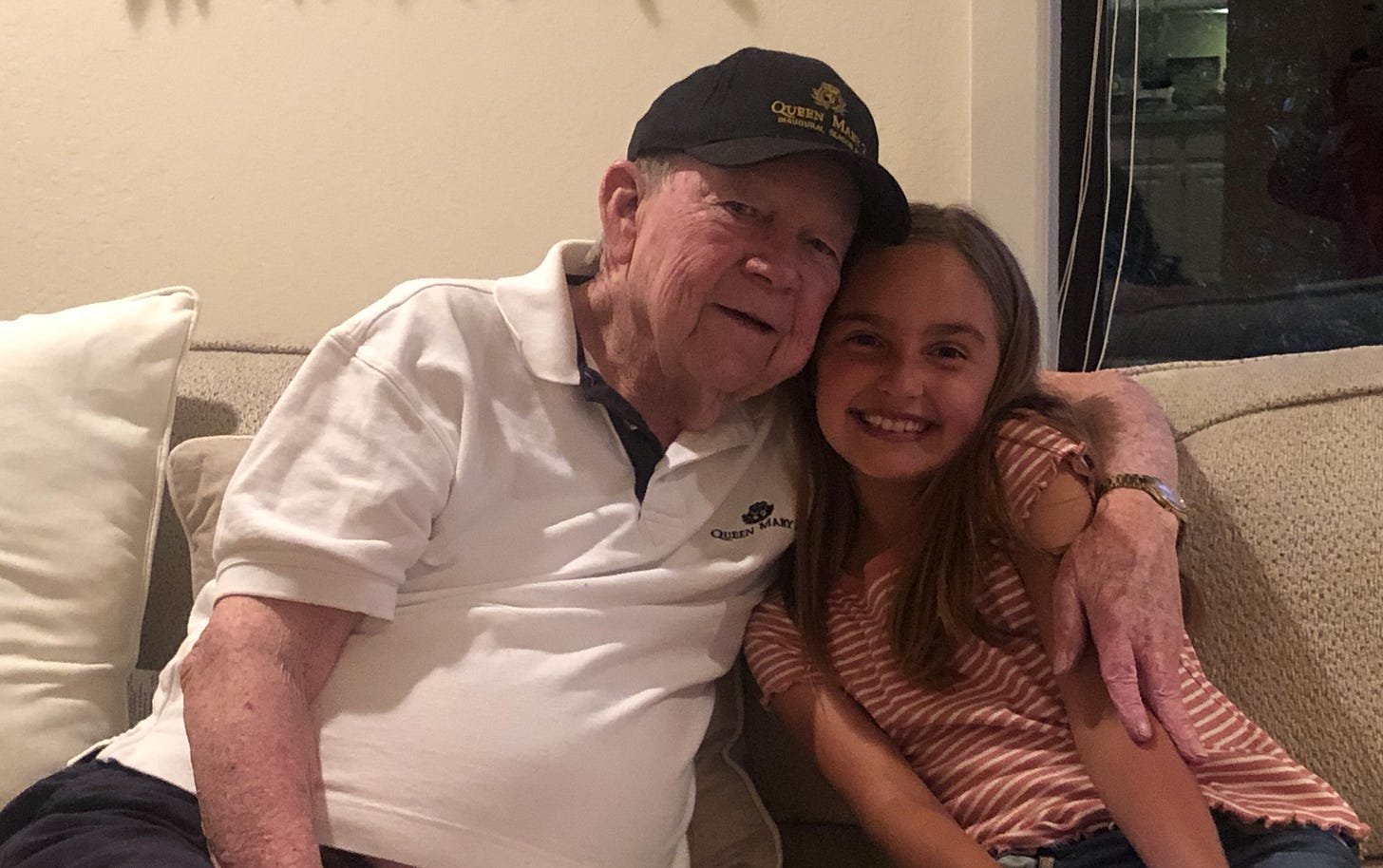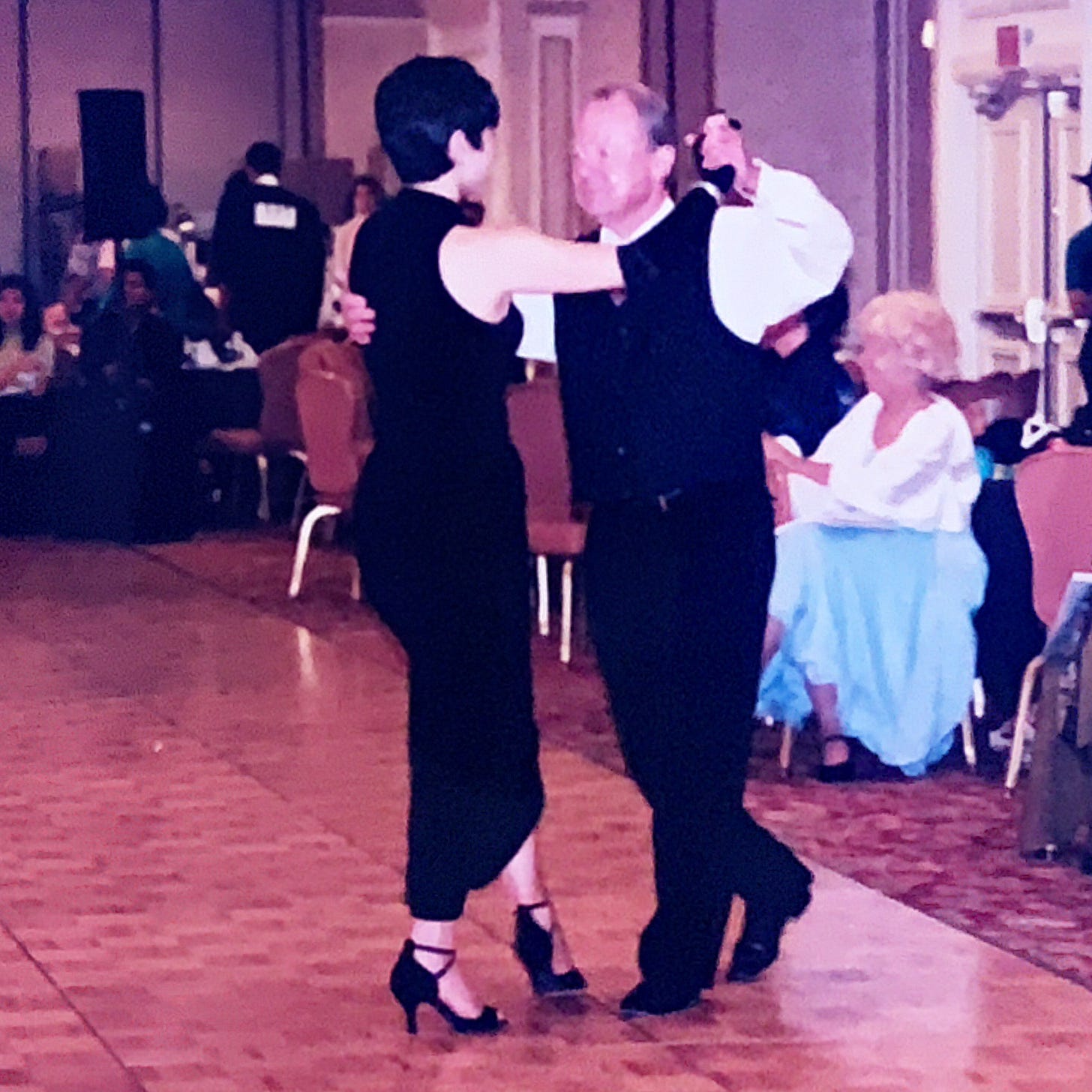Convincing Dad To Stop Driving
Careful what you wish for. It may break your heart in the process.
👋 Hello, I’m Kevin Ferguson and welcome to 🍷 Rain on the Monte Bello Ridge,🍷 a memoir about health, aging and winemaking. (Book summary) 🍇 This is my newsletter. It includes book research and early release chapters about winemaker Mario Gemello and his centenarian widow, Kay Gemello. 📖 They are my lovable maternal grandparents. You can subscribe by clicking on this handy little button.
Today’s edition is a personal essay about the hard learned lessons in dealing with a parent in declining health. If some of you recognize this post, you’re not crazy. It originally appeared as a guest essay on Alice Goldbloom’s A Considerable Age site.
Convincing Dad To Stop Driving
I started doing my dad’s grocery shopping at the brink of the pandemic shutdown in March of 2020. He lived alone, five minutes away and was in declining health.
He suffered from a progressive and irreversible lung disease called chronic obstructive pulmonary disease (COPD). He was 84 and used an oxygen tank to help stabilize his breathing, multiple times a day.
I’d check in on him, almost daily. My trips to the grocery store were not only to shrink his bubble during the pandemic, but also aimed at minimizing his need to drive. Before the lockdown, I got a glimpse of how much his driving skills had declined when I attended one of his doctors visits and let him drive. A lot of jerky movements and close calls. It was scary.
Dad sharing a special moment with his granddaughter.
He agreed to have me shop for him. But over time, I started to spot “breadcrumbs” that hinted he was taking the car out on occasion. He often denied it, but his lies were glaring.
“Where did this potato salad come from?”
“I don’t know,” he’d say.
He had a hard time practicing COVID safety best practices. His stability wasn’t great and so he often slid a hand along counters to aid his balance. That would irk me when I’d see him do it in a doctor’s waiting room, because I was also caregiving for my 99-year-old maternal grandmother to shrink her pre-vaccine era bubble.
I lectured my dad about the safety concerns of him going to the store after catching him upon return with a kitchen full of groceries. The following day, he sat me down, and told me, “I don’t want you to give me a bad time about my driving. I have to make these occasional runs to the store.”
The following day, he sat me down, and told me, “I have to make these occasional runs to the store.”
“Why?” I asked.
“Just to see if I can still do it,” he said.
In April that year, his dermatologist had spotted a discoloration on his outer ear. A biopsy confirmed it was cancerous. They scheduled surgery to remove it so the cancer wouldn’t spread. This set off a chain of notifications, including one to his primary doctor, who ordered him to modify his daily pill routine.
She instructed him to take a 5-day hiatus on his blood thinner pill to prevent severe bleeding.
I had a strong suspicion that my dad was going to mess that up. So the day before the change, I came over and asked to see his Sunday-through-Saturday pillbox. It was Monday, and the pill box was already a mess. That day’s evening pills were already gone. It was 11:30 am. The Wednesday morning box was also empty. He got defensive when I questioned him.
“I took my pills today,” he said. “I took them out of Wednesday’s box.”
When I asked him why, he didn’t have a good answer. My questions agitated him.
I showed him the instructions I printed out from his Sutter Health online account.
He stared at it with confusion. “Why don’t I have this?”
“You do. I printed it out from your Sutter account.”
I pointed out that Xaralto was his blood thinner.
“It’s the red pill, Dad,” I said. “Let’s make sure the pillbox is set up correctly for the week of your surgery. He spent 20-25 minutes prepping his pillbox as I supervised. I was seeing the anxiety and frustration of his independence slipping away.
After I left, I called his palliative care nurse, Jill Bryon. I relayed the story to her. She suggested that I should take over filling his pillbox and spot checking his pill-taking routine. I asked her if these cognitive challenges could be a sign that he was unfit to be still driving.
“Possibly. But the first step would be to give him a MoCa test,” she said, referring to the Montreal Cognitive Assessment Test. “If he doesn’t pass that, it could suggest signs of dementia.”
On the day of the test, Nurse Bryon arrived and found my Dad sitting on his couch watching ESPN. I sat in a chair next to him.
She entered with her usual cheerful attitude, wearing a light blue mask. We exchanged pleasantries as she took a seat to the left of my Dad.
“How are you doing Mr. Ferguson?” She asked.
“Oh, I’m doing OK.”
Dad showcasing his ballroom dancing skills.
After 20 minutes of chit chat peppered with questions for her to measure his engagement, she asked if he would be willing to partake in a short cognitive test.
“Now, what is that?” he asked.
“It’s called the MoCa test. It’s designed to measure possible signs of dementia, Alzheimers or Parkinson’s.”
My heart skipped a beat when she phrased it like that. Signs of dementia? There’s no way he’s going to agree to that kind of test. But to my surprise, he did.
He aced the first two questions. Where are you at and what city?
“My apartment in Redwood Shore,” he said.
“The next question is a memory test,” she said. “I am going to read a list of words that you will have to remember now and a few minutes later on. When I am through, tell me as many words as you can remember.”
He had no problem with the immediate callback of: Face, Velvet, Daisy and Red.
The next question caught him off guard, when asked to tell her as many words that start with the letter “F” in sixty seconds.
After two, he was stumped.
She asked him to subtract 7 from 100. “Then, keep subtracting 7 from your answer until I tell you to stop.”
“93…” The next calculation stumped him.
“How many letters are in the alphabet?
“The alphabet? Hmm.” He searched his mind for quite a while.
Watching him struggle through this test, I’d never been so conflicted in my life. I just wanted him to stop driving and agree to a part-time caregiver. But now, I found myself rooting for him.
Come on Dad! I said, in my head. 26! You got this!
“I don’t know.”
My heart sunk.
Next, she revisited the memory question. When he struggled, she prompted him with clues.
“It’s a body part,” she said.
Blank stare.
“Ok. Multiple choice: ‘Nose, face, hand, leg.’”
“Face!”
A passing score is 26 out of 30. He fell just short with 25, partly due to a lot of help. It wasn’t enough of a red flag to trigger more tests and ultimately surrender his car keys.
About two months later, I arrived to take him to another doctor’s appointment. His decline had been even more rampant. He was more reliant on his oxygen tank. He also needed my assistance in getting down the stairs from his second story apartment.
I knew then, his driving days were over.
My father hung on for two more years, before passing away on February 10th of this year. Here’s a tribute soon after, Memorializing My Dad, Bren Ferguson.






Oh my. I feel for you. It''s so hard to watch them struggle with those routine things and imagine the anxiety when they know they can't do what used to be so easy for them.
Thank you for sharing this snapshot of your time with your father. Driving is a tough issue, often connected to others. It sounds as if you acted with great compassion.